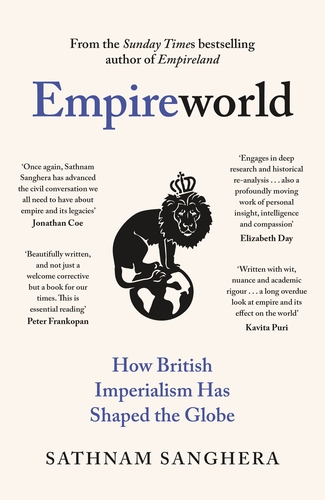This is the follow-up to his book Empireland (which I reviewed here). It is a wide-ranging and brilliant book, along the lines of a ‘what did the Romans ever do for us’ enquiry. In reality, as with his earlier book, he is scathing of imperialism’s legacy but also tries to show how the world has been changed by it. One reviewer said that the more he writes, the more left-wing he becomes.
He goes on holiday to Barbados. On the journey there, he illustrates how the British empire influenced various facets of his trip. Sanghera spotlights attempts to downplay this history as reprehensible. Naturally, he references British elites who still reap the power and wealth flowing from such exploitation. Those unaware of slavery’s enduring legacy should read this part of the book
The book shows the cultural roots of the Empire and its continuation. He shows how Kew Gardens was a major developer of empires through plants and how similar institutions were developed in the colonies. So it facilitated the spread of the rubber plant, out of which vast fortunes are made. But one of the most important things it did was the development of quinine, a product of a South American tree. This was vital for the colonisation of Africa because Europeans were being killed in great numbers by malaria. In fact, Britain issued it to all its troops in the form of tonic water. In the end, this tree was transplanted to Indonesia and other countries, and the wealth was lost to South America. Africa was colonised.

Sanghera shows how the British claims to have civilised the world were fraudulent. The British state claimed it ended slavery and spread it throughout the world, but in reality, it continued to benefit where it still existed. It then developed a system of indentured workers from India and Asia, which almost amounted to the same thing. Huge numbers were transported all over the world. Also, it consciously spread division between the ex-slaves and this new labour. Such divisions still exist. In fact, this divide and rule is one of the worst legacies of empire. In this, he includes Palestine.
Uncritical historians and official propaganda claim Britain spreads the rule of law. He demolishes this argument, showing that anti-gay laws that now exist all over the world are mostly in ex-British colonies. He also goes through the record in India, where Indian judges could adjudicate on British colonisers. The clear racism in the judicial systems that he exposes is a very powerful section.
He goes through the legacy of the Empire and racism, particularly through the Royal Family, its links to slavery, and its avoidance of reparations. He estimates Britain should pay back trillions. Also, there is cultural robbery, such as the Benin bronzes. On the invention of racial ‘colour’, he quotes Dubois, and the chapter is also worth a read. Many things we take for granted are re-examined. The empire’s transformative power amazes Sanghera; he notes how it shaped driving customs and even the very borders of nations.
This latter aspect he deals with in regard to Nigeria, for example, where instead of borders being along natural dividing lines, they are on straight lines, and tribes are put together with no historical links. Out of this, he has a whole chapter on the chaos this has created and how European companies have benefited. How corruption on an epic level was brought to these countries by the West.
Sanghera attempts to highlight the benefits brought by the empire, emphasising modern medicines and similar advancements. He convincingly demonstrates the positive impact of Britain’s multiculturalism. Ultimately, he delivers a powerful message: we must acknowledge the empire’s destructive legacy and the necessity of large-scale reparations.
This book offers valuable insights, particularly when paired with its predecessor. Consider attending a book launch to participate in the conversation. The author challenges right-wing narratives about the empire’s benefits, initiating a discussion the left should champion. This dialogue explores potential futures if we successfully dismantle the current system.
It is no wonder that Sanghera is heavily attacked on social media because he is not ‘grateful’ to his British homeland. In fact, this has happened only since he has been writing these kinds of books. In 10 years of writing for the Financial Times, he never got a single racist comment! Historian William Dalrymple says that although he himself is writing on similar lines, he has not had any attacks because he is white.
Art (53) Book Review (121) Books (114) Capitalism (65) China (79) Climate Emergency (98) Conservative Government (90) Conservative Party (45) COVID-19 (44) Economics (40) EcoSocialism (55) Elections (83) Europe (46) Fascism (56) Film (49) Film Review (68) France (70) Gaza (60) Imperialism (98) Israel (123) Italy (46) Keir Starmer (52) Labour Party (111) Long Read (42) Marxism (48) Palestine (169) pandemic (78) Protest (152) Russia (340) Solidarity (142) Statement (48) Trade Unionism (141) Ukraine (345) United States of America (132) War (368)

